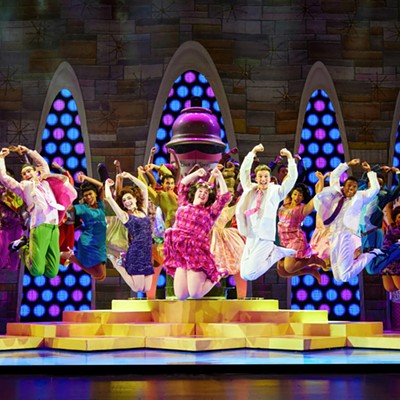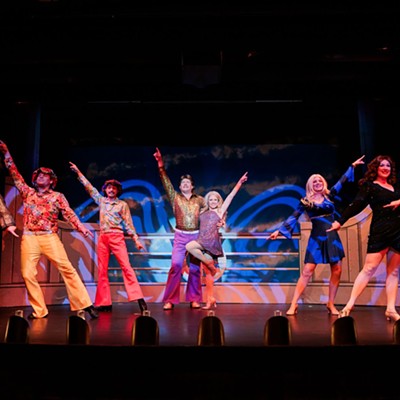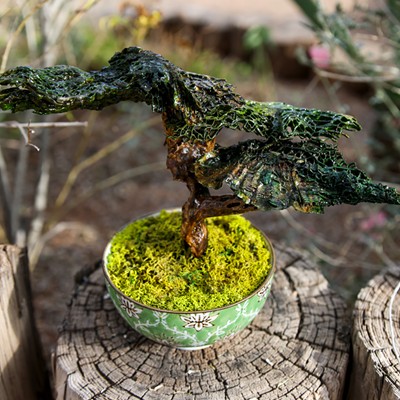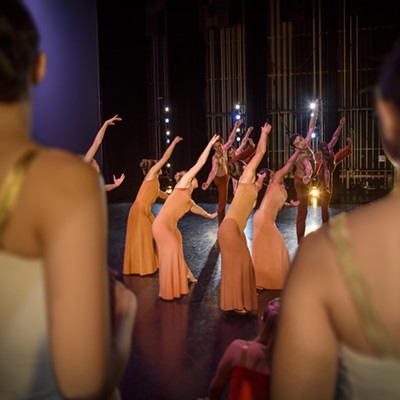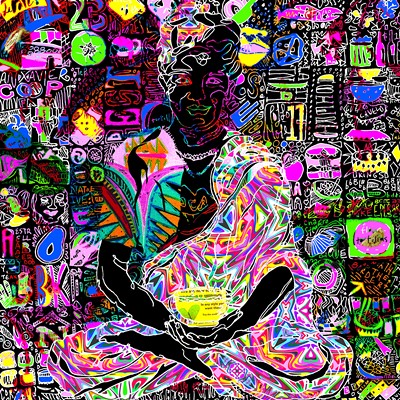What seems to us to be the dual nature of our lives has bemused and befuddled us, nurtured and terrorized us throughout our history.
We feel it on personal, cultural and spiritual levels. Some imagine angels on one shoulder debating with the devils on the other, and that in a heavenly world, the angels would win the debate. Some have claimed that without the antithesis to the thesis there would be no synthesis, no movement. And some think there can a union of dark and light, a coherent whole, a tenuous, if not perfect, balance.
In his darkly comic play True West, actor/playwright Sam Shepard has conceived a story that allows us to observe what happens when opposites, in this case two brothers, come together unexpectedly in the most benign of places; how their opposite natures are destined to clash; and how the ugly arc of their convergence takes them violently to the opposite sides of themselves.
Shepard's play is being staged by yet another new theater company in town. Speak the Speech Theatre (it's a reference to Hamlet's advice to the players) is launching itself quietly but ambitiously with a difficult piece that requires significant measures of intelligent, interpretive insights, courageous acting and technical sophistication. Although there are issues that prevent this from being a top-notch production, there is evidence that the new company may deserve to find an audience, even in our highly populated theater landscape.
If nothing else, there is evidence of recognition of a damn good play. Shepard's piece was first produced in 1980 in San Francisco. Though without formal training, Shepard had already been lauded for his plays The Tooth of Crime (1972), Curse of the Starving Class (1978) and Buried Child, which won the Pulitzer Prize in 1979. This was after winning a half-dozen Obie Awards (for Off-Broadway shows) during the '60s. He is a prolific writer in many media, as well as a respected actor who was nominated for an Academy Award for his portrayal of astronaut Chuck Yeager in 1983's The Right Stuff.
There are themes that bounce through Shepard's writing. ("Runs through" seems a little too tame.) Dysfunctional families, especially fathers, is one of those, and so is a fascination with the American West, both of which help form the structure upon which he builds True West. The themes are not unfamiliar, but they are revealed in a storytelling style that is fearless and explosive.
Austin (Mike Sultzbach) is house-sitting at his mother's place while she is in Alaska. He's a screenwriter, working on a script that has piqued the interest of a producer. He's a normal kind of guy in his chinos and topsiders, with a family "up north." He's a plodder, a good and dependable citizen of the new American West and its capital, Los Angeles. His brother, Lee (Ken Beider), has shown up unexpectedly, offering a personification of the other end of the good/evil, level-headed/crazy-minded, law-abiding/criminal spectra. He swills beer, pesters Austin and berates his Ivy League education and his work. He says he has been living in the desert, engaging in dog fighting and petty thievery, and enjoying a life of solitude.
Lee says anybody can write and sell a script, and he proceeds to insinuate himself with the producer who comes to talk to Austin. Lee, while playing golf with Saul (Don Cline), relates to him his script idea—it's a Western—and Saul says he is interested. When Austin hears of this, he is appalled, jealous and hurt, and even though Saul says he will still work with Austin, Austin begins his descent into the dark side. Now Lee sits at the typewriter and Austin drinks himself into a stupor and decides he wants to live in the desert. Austin even goes a-thieving: He steals a dozen or more toasters from homes in the neighborhood one night.
The result of these parallel but opposite arcs is a mess, literally and figuratively. But when Mother (Sydney Flynn) arrives home unexpectedly, she seems nonplussed. And when Austin attacks Lee, seriously choking him, she simply tells them to go outside to fight.
It's horrible; it's funny. Perhaps we are not exactly sure what we have witnessed, but if Shepard's voice is interpreted well, we know we have experienced something alarmingly absurd. Or absurdly alarming. Someone has thrown a rock through the window, and although the structure itself may still be sound, some piece of it has been shattered.
STS's production, directed by Dan Reichel, offers glimpses of how effective Shepard's piece can be, but there have been some suspect choices that get in the way. For one thing, Lee dresses and acts more like a drunken bum than a lone wolf. The idea that Saul would even get close to him, no less play golf with him, is just not credible. Nor do we see a believable diligence with his scriptwriting—he seems no less sober when he's hunting and pecking than he does otherwise. And Austin himself seems to lose some of the credibility of his characterization as he drifts into his other side.
There are also some casting issues. Cline, although sincere in his portrayal of Saul, is simply miscast. Joe Long's set is well rendered, but transitions between scenes are awkward.
Perhaps the greatest hindrance is a lack of effective pacing, of building toward a climax, which in this case should be explosive. Every scene seems to have the same pace and tenor, and by extension, import. That makes the play seem long and the payoff hard to discern.
However, the richness of Shepard's play is represented well enough to be intriguing and thought-provoking. Even if not all aspects of the production work smoothly, the efforts of some good theater minds are evident in this inaugural production.

